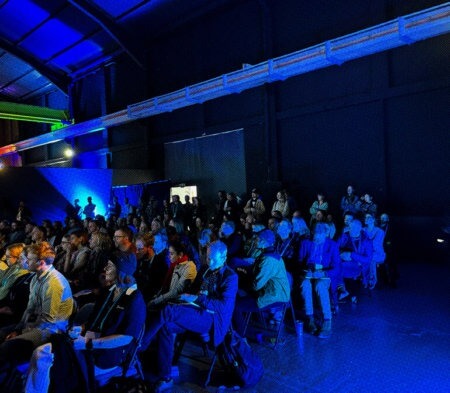
Last week I attended Blue Earth Summit – one of the biggest sustainabilty-focused events in the calendar; a mecca for those part of or wanting to find connection to businesses and communities that are aiming to make a positive difference in the world. A lot went on at the event so here’s five guiding thoughts from across the three days and action points on how we might take those ideas forward.
There is a greater swell of energy when you’re face-to-face with 1,000s of people connecting, sharing knowledge and motivating one another to do better. The buzz in the room was real, but it’s also a bubble and we’ve got to take that same energy out into the world, outside our own echo-chamber.
What happens now? Blue Earth Summit is a huge gathering but what micro meet-ups can we arrange to keep this community alive in smaller, more local ways?
From talks to panels to the beer-infused chats at the end of each day, the theme rampaging through the event was that we’re not going to take anymore shit. The collective tone was defiant. The challenge now is to look both outwards and inwards to understand and define what we will and won’t accept for our future, then do something about it.
Karla Morales-Lee said in her talk how, when pregnant, she stood in the mirror and asked herself “Is this really the most I can do?”. Her honest response was “no, I can do more”… and it led her to starting The Warrior Women Network and being part of She Changes Climate.
What happens now? We all need to be the change we want to see. In our businesses, in our communities and in our lives. There are far too few people taking on the burden of moving everyone forward. So let’s stand in the mirror and ask ourselves Karla’s question – you never know what action it might compell us to take.

During another talk, an audience member asked “we have CSR and ESG, what about Corporate Political Responsibility?”. This tied into wider commentary about the government’s various attacks on nature and whether it’s even worth putting effort into lobbying them to change when the work could be done by people and business that can move faster. Shell saying to the government “tax us” is case-in-point.
For me, action needs to come from all sides. Signing a petition might be someone’s first step that then leads them onto bigger, bolder moves – so don’t knock it. But, if you can do more, do it. Everyone has a role to play, not just the people with placards or those at the very top of business.
What happens now? Pick a lane, any lane. If you’re politically minded, direct action to MPs, legislation and governing bodies might be the route for you. If you want to change your business, whether it’s your own or one you work for, do that. Here’s a good resource from Draw Down: “Job Function Action Guides” and another from Mindful Commerce: “Sustainability Framework” to get you started.
The balance of ethnicities, body types, identity and abilities in the room is still tipped towards hetro-body-normative-white notions of being. It was humbling to hear from the likes of Abraham Bugre, a Climate Change Consultant and Researcher from Ghana, talking about how he’s tired of the representation that pegs the Global South as victims not action takers, when the reality is anything but. Films from Adventure Uncovered told empowering stories of black and Muslim triumph in an (outdoor) world that doesn’t always welcome them. Looking around the audience however, it was evident that we’re not doing enough to bring different voices into these types of spaces.
We missed young people too. Lots of conversations about how brands need to engage with the next generation and how Gen Z shoulders a lot of the responsibility for change already – but they weren’t there to share their thoughts or to be galvanized and feel supported by their ‘elders’ and we, in turn, weren’t able feel the same from them.
What happens now? Open the access. Connect with communities, schools and groups that wouldn’t normally be exposed to these kinds of events – and smaller meet-ups – with experiences that integrate all kinds of cultures, ideas and shared knowledge.
The role of effective storytelling never goes away. Empassioned speeches, engaging presentations, inspiring films, heartfelt conversations all went into the mix to help us envision what a just and thriving future could look like – and what would happen if we did nothing at all. “Content” gets a bad rap but when properly executed, the stories we tell – as people or businesses – have the power to change mindsets and actions that impact our world for the better.
What happens now? Start with defining the impact you’re seeking to make and work backwards. Think: “how does my purpose permeate throughout my whole business – not just in my outward communication?” Tell the journey to bring your audience along with you. No lies, no wishy-washy statements that don’t mean anything. Be honest and creative and always, always measure your impact.
If you were at the Blue Earth Summit, what were your takeaways? Were you motivated to take any specific actions? I’d love to know. Email me at info@letsgothisway.com or comment on Instagram or LinkedIn.
Finally, if telling (and living) your story is something that you struggle with, fear not. There’s support out there – including working with This Way – to help you connect your purpose and vision to audiences in a way that adds value and creates impact. Drop me an email and let’s chat! Want some tips straight away? Check out ‘How to: Know What to Write‘ article.